小学英语六年级总复习一般现在时
(完整word版)外研版小学英语语法总复习知识点归纳

(完整word版)外研版小学英语语法总复习知识点归纳外研版小学英语语法总复知识点归纳一、时态1.一般现在时(1)表示经常发生的动作或事情,通常用“usually通常,often常常,every…每…。
sometimes有时,always总是,”等词。
(2)基本结构:主语I / You / We / They /He / She / It肯定句:主语+动词原形或动词第三人称单数形式否定句:主语+don’t + 动词原形或者doesn’t + 动原一般疑问句(Yes/No) Do…。
Yes。
I do.No,I don’t.Does…(动词原形)…?Yes,he/she does。
No,he/she doesn’t.特殊疑问句What do …。
How does she…(动词原形)…?(3)动词第三人称单数方式(同名词单数酿成复数办法不异)1.普通情形+s如:walk-walks2.辅音字母+y结尾去y +ies fly-flies3.结尾是s。
x,sh。
ch +es watch-watches4.结尾是0 +es do-does。
go-goes5.特殊have-has2.现在进行时(1)表示正在发生的动作,通常用“now现在。
look看,XXX听”.(2)根本方式: be +动词-ingeg: I am(not) XXX.You/We/They are(not) reading。
He/She/It is(not) eating.What are you doing。
Is he reading?(3)动词的目前分词方式(动词+ing)普通情形+ing walk—walking末端是不发音的e-e+ingcome—coming重读闭音节双写末了一个字母+ingswim-swimming。
run-running3.一般过去时(1)表示过去已经发生的事情,通常用“last …上一个…。
just now刚才,many years ago许多年前,XXX昨天”等词。
小学英语语法复习:一般现在时

小学英语语法复习:一般现在时一般现在时基本用法介绍【No。
1】一般现在时的功能1。
表示事物或人物的特征、状态。
如:The sky is blue。
天空是蓝色的。
2。
表示经常性或习惯性的动作。
如:I get up at six every day。
我天天六点起床。
3。
表示客观现实。
如:The earth goes around the sun。
地球绕着太阳转。
一般现在时的构成1。
be动词:主语 be(am,is,are) 其它。
如:I am a boy。
我是一个男孩。
2。
行为动词:主语行为动词( 其它)。
如:We study English。
我们学习英语。
当主语为第三人称单数(he, she,it)时,要在动词后加“-s”或“-es”。
如:Mary likes Chinese。
玛丽喜欢汉语。
【No。
2】一般现在时的变化1。
be动词的变化。
否定句:主语 be not 其它。
如:He is not a worker。
他不是工人。
一般疑问句:Be 主语其它。
如:-Are you a student?-Yes。
I am。
/ No,I‘m not。
非凡疑问句:疑问词一般疑问句。
如:Where is my bike?2。
行为动词的变化。
否定句:主语don’t( doesn‘t ) 动词原形( 其它)。
如:I don’t like bread。
当主语为第三人称单数时,要用doesn‘t构成否定句。
如:He doesn’t often play。
一般疑问句:Do( Does ) 主语动词原形其它。
如:- Do you often play football?- Yes, I do。
/ No,I don‘t。
当主语为第三人称单数时,要用does构成一般疑问句。
如:- Does she go to work by bike?- Yes, she does。
/ No,she doesn’t。
动词 s的变化规则1.一般情况下,直接加-s,如:cook-cooks, milk-milks2.以s。
小学英语六年级总复习语法及练习题一
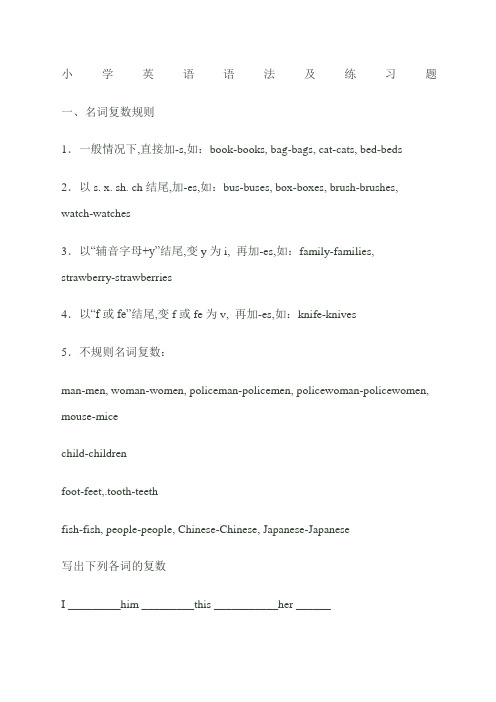
小学英语语法及练习题一、名词复数规则1.一般情况下,直接加-s,如:book-books, bag-bags, cat-cats, bed-beds 2.以s. x. sh. ch结尾,加-es,如:bus-buses, box-boxes, brush-brushes, watch-watches3.以“辅音字母+y”结尾,变y为i, 再加-es,如:family-families, strawberry-strawberries4.以“f或fe”结尾,变f或fe为v, 再加-es,如:knife-knives5.不规则名词复数:man-men, woman-women, policeman-policemen, policewoman-policewomen, mouse-micechild-childrenfoot-feet,.tooth-teethfish-fish, people-people, Chinese-Chinese, Japanese-Japanese写出下列各词的复数I _________him _________this ___________her ______watch _______child _______photo ________diary ______day________ foot________ book_______ dress ________tooth_______ sheep ______box_______ strawberry _____thief _______yo-yo ______ peach______ sandwich ______man______ woman_______ paper_______ juice___________water________ milk________ rice__________ tea__________二、一般现在时一般现在时基本用法介绍No. 1一般现在时的功能1.表示事物或人物的特征、状态;如:The sky is blue.天空是蓝色的;2.表示经常性或习惯性的动作;如:I get up at six every day.我每天六点起床;3.表示客观现实;如:The earth goes around the sun.地球绕着太阳转;一般现在时的构成1. be动词:主语+beam,is,are+其它;如:I am a boy.我是一个男孩;2.行为动词:主语+行为动词+其它;如:We study English.我们学习英语;当主语为第三人称单数he, she,it时,要在动词后加"-s"或"-es";如:Mary likes Chinese.玛丽喜欢汉语;一般现在时的变化1. be动词的变化;否定句:主语+ be + not +其它;如:He is not a worker.他不是工人;一般疑问句:Be +主语+其它;如:-Are you a student-Yes. I am. / No, I'm not.特殊疑问句:疑问词+一般疑问句;如:Where is my bike2.行为动词的变化;否定句:主语+ don't doesn't +动词原形+其它;如:I don't like bread.当主语为第三人称单数时,要用doesn't构成否定句;如:He doesn't often play.一般疑问句:Do Does +主语+动词原形+其它;如:- Do you often play football- Yes, I do. / No, I don't.当主语为第三人称单数时,要用does构成一般疑问句;如:- Does she go to work by bike- Yes, she does. / No, she doesn't.特殊疑问句:疑问词+一般疑问句;如:How does your father go to work 动词+s的变化规则1.一般情况下,直接加-s,如:cook-cooks, milk-milks2.以s. x. sh. ch. o结尾,加-es,如:guess-guesses, wash-washes,watch-watches, go-goes3.以“辅音字母+y”结尾,变y为i, 再加-es,如:study-studies一般现在时用法专练:一、写出下列动词的第三人称单数drink ________ go _______ stay ________ make ________look _________ have_______ pass_______ carry ____ come________ watch______ plant_______ fly ________ study_______ brush________ do_________ teach_______二、用括号内动词的适当形式填空;1. He often ________have dinner at home.2. Daniel and Tommy _______be in Class One.3. We _______not watch TV on Monday.4. Nick _______not go to the zoo on Sunday.5. ______ they ________like the World Cup6. What _______they often _______do on Saturdays7. _______ your parents _______read newspapers every day8. The girl _______teach us English on Sundays.9. She and I ________take a walk together every evening.10. There ________be some water in the bottle.11. Mike _______like cooking.12. They _______have the same hobby.13. My aunt _______look after her baby carefully.14. You always _______do your homework well.15. I _______be ill. I’m staying in bed.16. She _______go to school from Monday to Friday.17. Liu Tao _______do not like PE.18. The child often _______watch TV in the evening.19. Su Hai and Su Yang _______have eight lessons this term.20. -What day _______be it today-It’s Saturday.三、按照要求改写句子1. Daniel watches TV every evening.改为否定句___________________________________________________2. I do my homework every day.改为一般疑问句,作否定回答________________________________________________________ 3. She likes milk.改为一般疑问句,作肯定回答___________________________4. Amy likes playing computer games.改为一般疑问句,作否定回答___________________________________________________5. We go to school every morning.改为否定句_______________________________________________________ 6. He speaks English very well.改为否定句___________________________________________________7. I like taking photos in the park.对划线部分提问________________________________________________________ 8. John comes from Canada.对划线部分提问___________________________________________________9. She is always a good student.改为一般疑问句,作否定回答________________________________________________________ 10. Simon and Daniel like going skating.改为否定句___________________________________________________五、改错划出错误的地方,将正确的写在横线上1. Is your brother speak English __________________2. Does he likes going fishing __________________3. He likes play games after class. __________________4. Mr. Wu teachs us English. __________________5. She don’t do her homework on Sundays. _________________三、现在进行时1.现在进行时表示现在正在进行或发生的动作,也可表示当前一段时间内的活动或现阶段正在进行的动作;2.现在进行时的肯定句基本结构为be+动词ing.3.现在进行时的否定句在be后加not;4.现在进行时的一般疑问句把be动词调到句首;5.现在进行时的特殊疑问的基本结构为:疑问词不达意+ be + 主语+ 动词ing但疑问词当主语时其结构为:疑问词不达意+ be + 动词ing动词加ing的变化规则1.一般情况下,直接加ing,如:cook-cooking2.以不发音的e结尾,去e加ing,如:make-making, taste-tasting3.如果末尾是一个元音字母和一个辅音字母,双写末尾的辅音字母,再加ing,如:run-running, stop-stopping现在进行时专项练习:一、写出下列动词的现在分词:play________ run__________ swim _________make__________go_________ like________ write________ _ski___________read________ have_________ sing ________ dance_________put_________ see________ buy _________ love____________live_______ take_________ come ________ get_________stop_________ sit ________ begin________ shop___________二、用所给的动词的正确形式填空:1.The boy __________________ drawa picture now.2. Listen .Some girls _______________ singin the classroom .3. My mother _________________ cook some nice food now.4. What _____ you ______ do now5. Look . They _______________ have an English lesson .6.They ____________not ,water the flowers now.7.Look the girls ________________dance in the classroom .8.What is our granddaughter doing She _________listen to music.9. It’s 5 o’clock now. We _____________havesupper now10.______Helen____________wash clothes Yes ,she is .三、句型转换:1. They are doing housework .分别改成一般疑问句和否定句__________________________________________________________________________________________________________________________ 2.The students are cleaning the classroom . 改一般疑问句并作肯定和否定回答________________________________________________________________ _________________________________________________________________ _3.I’m playing the football in the playground .对划线部分进行提问________________________________________________________________ _4.Tom is reading books in his study . 对划线部分进行提问四、将来时理论及练习一、概念:表示将要发生的动作或存在的状态及打算、计划或准备做某事;句中一般有以下时间状语:tomorrow, next dayweek, month, year…,soon, the day after tomorrow后天等;二、基本结构:①be going to + do;②will+ do.三、否定句:在be动词am, is, arel后加not或情态动词will后加not成won’t;例如:I’m going to have a picnic this afternoon.→ I’m not going to have a picnic this afternoon.四、一般疑问句:be或will提到句首,some改为any, and改为or,第一二人称互换;例如:We are going to go on an outing this weekend. → Are you going to go on an outing this weekend五、对划线部分提问;一般情况,一般将来时的对划线部分有三种情况;1. 问人;Who 例如:I’m going to New York soon. →Who’s going to New York soon.2. 问干什么;What … do.例如:My father is going to watch a race with me thisafternoon. →What is your father going to do with you this afternoon.3. 问什么时候;When.例如:She’s going to go to bed at nine. →When is she goingto bed六、同义句:be going to = willI am going to go swimming tomorrow明天. = I will go swimming tomorrow. 练习:填空;1. 我打算明天和朋友去野炊;I_____ _______ _________ have a picnic with my friends.I ________ have a picnic with my friends.2. 下个星期一你打算去干嘛我想去打篮球;What ________ ________ _________ _________ _________ next Monday I _______ ______ _____ play basketball.What _________ you do next Monday I ________ play basketball.3. 你妈妈这个周末去购物吗是,她要去买一些水果;_____ your mother _______ ________ go shopping this ___________Yes, she _________. She ______ ________ __________ buy some fruit.4. 你们打算什么时候见面;What time _______ you _________ __________ meet改句子;5. Nancy is going to go camping.改否定Nancy ________ going to go camping.6. I’ll go and join them.改否定I _______ go ______ join them.7. I’m going to get up at 6:30 tomorrow.改一般疑问句________ _______ ________ to get up at 6:30 tomorrow8. We will meet at the bus stop at 10:30.改一般疑问句_______ ________ meet at the bus stop at 10:30.9. She is going to listen to music after school.对划线部分提问________ _______ she ________ ________ _________ after school10. My father and mother are going to see a play the day after tomorrow.同上_________ _________ going to see a play the day after tomorrow.用所给词的适当形式填空;11. Today is a sunny day. We ___________________ have a picnic this afternoon.12. My brother _______________ go to Shanghai next week.13. Tom often ______________go to school on foot. But today is rain. He ______________ go to school by bike.14. What do you usually do at weekends I usually __________ watch TV and ____________catch insects15. It’s Friday today. What _____she _________ do this weekend She ______________ watch TV and _____________ catch insects.16. What ___________ d0 you do last Sunday I ____________ pick apples on a farm. What ______________ do next Sunday I ______________ milk cows.17. Mary ____________ visit her grandparents tomorrow.18. Liu Tao ____________ fly kites in the playground yesterday.19. David ______________ give a puppet show next Monday.20. I ________________ plan for my study now五、一般过去时1.一般过去时表示过去某个时间发生的动作或存在的状态,常和表示过去的时间状语连用;一般过去时也表示过去经常或反复发生的动作感谢; 2.Be动词在一般过去时中的变化:⑴am 和is在一般过去时中变为was;was not=wasn’t⑵are在一般过去时中变为were;were not=weren’t⑶带有was或were的句子,其否定、疑问的变化和is, am, are一样,即否定句在was或were后加not,一般疑问句把was或were调到句首;3.句中没有be动词的一般过去时的句子否定句:didn’t +动词原形,如:Jim didn’t go home yesterday.一般疑问句:在句首加did,句子中的动词过去式变回原形;如:Did Jim go home yesterday特殊疑问句:⑴疑问词+did+主语+动词原形如:What did Jim do yesterday⑵疑问词当主语时:疑问词+动词过去式如:Who went to home yesterday动词过去式变化规则:1.一般在动词末尾加-ed,如:pull-pulled, cook-cooked2.结尾是e加d,如:taste-tasted3.末尾只有一个元音字母和一个辅音字母的重读闭音节,应双写末尾的辅音字母,再加-ed,如:stop-stopped4.以“辅音字母+y”结尾的,变y为i, 再加-ed,如:study-studied5.不规则动词过去式:am,is-was, are-were, do-did, see-saw, say-said, give-gave, get-got, go-went, come-came, have-had, eat-ate, take-took, run-ran, sing-sang, put-put,make-made, read-read, write-wrote, draw-drew, drink-drank, fly-flew, ride-rode, speak-spoke, sweep-swept, swim-swam, sit-sat过去时练习写出下列动词的过去式isam_________ fly_______ plant________ are ________drink_________ play_______ go________ make ________does_________ dance________ worry________ ask _____taste_________ eat__________ draw________ put ______throw________ kick_________ pass_______ do ________Be动词的过去时练习1Name ____________ No. ______ Date __________一、用be动词的适当形式填空1. I _______ at school just now.2. He ________ at the camp last week.3. We ________ students two years ago.4. They ________ on the farm a moment ago.5. Yang Ling ________ eleven years old last year.6. There ________ an apple on the plate yesterday.7. There ________ some milk in the fridge on Sunday.8. The mobile phone _______ on the sofa yesterday evening.二、句型转换1. It was exciting.否定句:________________________________________________ 一般疑问句:____________________________________________ 肯、否定回答:__________________________________________ 2. All the students were very excited.否定句:________________________________________________一般疑问句:____________________________________________ 肯、否定回答:__________________________________________ 3. They were in his pocket.否定句:________________________________________________ 一般疑问句:____________________________________________ 肯、否定回答:__________________________________________ Be动词的过去时练习2Name ____________ No. ______ Date __________一、用be动词的适当形式填空1. I ______ an English teacher now.2. She _______ happy yesterday.3. They _______ glad to see each other last month.4. Helen and Nancy ________ good friends.5. The little dog _____ two years old this year.6. Look, there ________ lots of grapes here.7. There ________ a sign on the chair on Monday..8. Today _____ the second of June. Yesterday ______ the first of June. It _____ Children’s Day. All the students ______ very excited.二、句型转换1. There was a car in front of the house just now.否定句:________________________________________________一般疑问句:____________________________________________肯、否定回答:__________________________________________肯、否定回答:__________________________________________三、中译英1.我的故事书刚才还在手表旁边;___________________________________________________________ 2.他们的外套上个礼拜放在卧室里了;___________________________________________________________ 3.一会以前花园里有两只小鸟;行为动词的过去时练习1Name ____________ No. ______ Date __________一、用行为动词的适当形式填空1. He _________ live in Wuxi two years ago.2. The cat ________ eat a bird last night.3. We _______ have a party last Halloween.4. Nancy ________ pick up oranges on the farm last week.5. I ________ make a model ship with Mike yesterday.6. They ________ play chess in the classroom last PE lesson.7. My mother _______ cook a nice food last Spring Festival.8. The girls ________ sing and _______ dance at the party.二、句型转换1. Su Hai took some photos at the Sports day.否定句:________________________________________________ 一般疑问句:____________________________________________ 肯、否定回答:__________________________________________2. Nancy went to school early.否定句:________________________________________________ 一般疑问句:____________________________________________ 肯、否定回答:__________________________________________ 3. We sang some English songs.否定句:________________________________________________ 一般疑问句:____________________________________________ 肯、否定回答:__________________________________________ 行为动词的过去时练习2Name ____________ No. ______ Date __________一、用be动词的适当形式填空1. I ______ watch a cartoon on Saturday.2. Her father _______ read a newspaper last night.3. We _________ to zoo yesterday, we _____ to the park. go4. ______ you _______ visit your relatives last Spring Festival5. ______ he _______ fly a kite on Sunday Yes, he ______.6. Gao Shan _______ pull up carrots last National Day holiday.7. I ____________ sweep the floor yesterday, but my mother ______.8. What ______ she _______ find in the garden last morning She __________ find a beautiful butterfly.二、句型转换1. They played football in the playground.否定句:________________________________________________一般疑问句:____________________________________________肯、否定回答:__________________________________________三、中译英1. 格林先生去年住在中国;________________________________________________________2. 昨天我们参观了农场;________________________________________________________3. 他刚才在找他的手机;________________________________________________________ 过去时综合练习1Name ____________ No. ______ Date __________一、用动词的适当形式填空1. It ______ be Ben’s birthday last Friday.2. We all ______ have a good time last night.3. He ________ jump high on last Sports Day.4. Helen ________ milk a cow on Friday.5. She likes ______ newspapers, but she ______ a book yesterday. read6. He _______ football now, but they _______ basketball just now. play7. Jim’s mother _________ plant trees just now.8. _______ they ________ sweep the floor on Sunday No, they _____.9. I _______ watch a cartoon on Monday.10. We ___________ go to school on Sunday.。
外研版小学英语语法总复习知识点归纳

外研版小学英语语法总复习知识点归纳一、时态1.一般现在时(1)表示经常发生的动作或事情,通常用“usually通常, often常常, every…每…, sometimes有时,always总是,”等词。
(2)基本结构:主语I / You / We / They /He / She / It肯定句:主语+ 动词原形或动词第三人称单数形式否定句:主语+ don’t + 动词原形或者doesn’t + 动原一般疑问句(Yes/No) Do… ? Yes, I do. No,I don’t.Does…(动词原形)…? Yes,he/she does. No,he/she doesn’t.特殊疑问句What do …? How does she…(动词原形)…?(3) 动词第三人称单数形式(同名词单数变成复数方法相同)1.一般情况 +s 如:walk-walks2. 辅音字母+y结尾去y +ies fly-flies3. 结尾是 s, x, sh, ch +es watch-watches4. 结尾是0 +es do-does, go-goes5. 特殊 have-has2.现在进行时(1)表示正在发生的动作,通常用“now现在, look看,linsen听”.(2)基本形式: be + 动词-ingeg: I am(not) doing my homework.You/We/They are(not) reading. He/She/It is(not) eating.What are you doing? Is he reading?(3)动词的现在分词形式(动词+ing)一般情况 +ing walk—walking结尾是不发音的 e -e + ing come—coming 重读闭音节双写最后一个字母+ing swim-swimming run-running3. 一般过去时(1) 表示过去已经发生的事情,通常用“last …上一个…, just now刚才, many years ago许多年前, yesterday昨天”等词。
小学六年级英语语法复习ppt课件

.
.
.
.
• 写出下列各词的复数 I _________him _________this ___________her ______ watch _______child _______photo ________diary ______
man______ woman_______ paper_______ juice___________ water________ milk________ rice__________ tea__________
.
• 2.行为动词:主语+行为动词(+其它)。如: We study English.我们学习英语。 当主语为第三人称单数(he, she,it)
时,要在动词后加"-s"或"-es"。如: Mary likes Chinese.玛丽喜欢汉语。
.
• 二、用括号内动词的适当形式填空。 1. He often ________(have) dinner at home. 2. Daniel and Tommy _______(be) in Class One. 3. We _______(not watch) TV on Monday. 4. Nick _______(not go) to the zoo on Sunday. 5. ______ they ________(like) the World Cup?
• 6, 用在序数词,方位词前和形容词最高级前, the first , the east, the tallest
.
• 3、零冠词(不用定冠词) (1)名词前已有作定语用的this, that, these, those, my, your, his, her, our, their, some等限 定词时,不用冠词。如:this eraser, her pencilbox, some boxes, those women等。 (2)泛指的不可数名词前一般不用冠词。如:meat, rice, water, bread, tea, milk, juice等。 (3)复数名词表示泛指时,不用冠词。如: the people in the room are doctors. 房间里的那 些人是医生。 (4)在表示学科的名词前一般不用冠词。如: Chinese, English, math, physics, history等。在 三餐饭和球类运动名词前一般不加冠词。如:have breakfast/ lunch/ supper, play basketball/ football等。 (5)在季节、节日、星期、月份前不用冠词。如: autumn, summer, winter, spring, Teachers’ day, Children’s day, Sunday, February等。 (6)在表颜色、语种和国家名词前不用冠词。如: white, brown, French, Australia等。 (7)在表示称呼语的名词之前,以及职务、头衔的 名词前不用冠词。如:Docto.r green is a scientist. 格林博士是位科学家。
小学英语 六年级四种时态总结
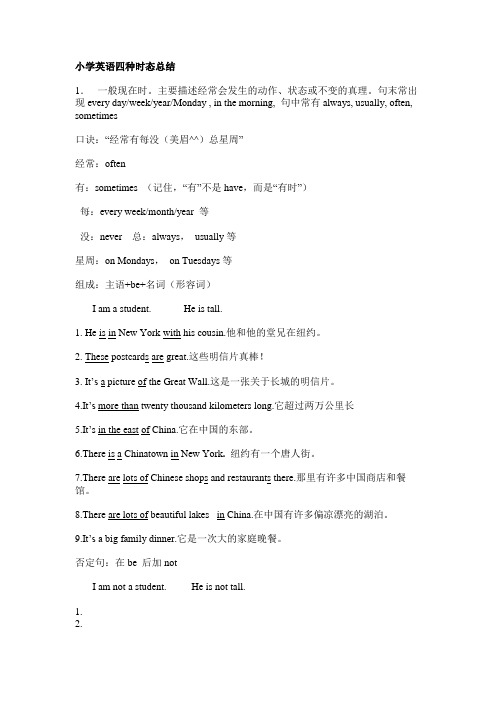
小学英语四种时态总结1.一般现在时。
主要描述经常会发生的动作、状态或不变的真理。
句末常出现every day/week/year/Monday , in the morning, 句中常有always, usually, often, sometimes口诀:“经常有每没(美眉^^)总星周”经常:often有:sometimes (记住,“有”不是have,而是“有时”)每:every week/month/year 等没:never 总:always,usually等星周:on Mondays,on Tuesdays等组成:主语+be+名词(形容词)I am a student. He is tall.1. He is in New York with his cousin.他和他的堂兄在纽约。
2. These postcards are great.这些明信片真棒!3. It’s a picture of the Great Wall.这是一张关于长城的明信片。
4.It’s more than twenty thousand kilometers long.它超过两万公里长5.It’s in the east of China.它在中国的东部。
6.There is a Chinatown in New York.纽约有一个唐人街。
7.There are lots of Chinese shops and restaurants there.那里有许多中国商店和餐馆。
8.There are lots of beautiful lakes in China.在中国有许多偏凉漂亮的湖泊。
9.It’s a big family dinner.它是一次大的家庭晚餐。
否定句:在be 后加notI am not a student. He is not tall.1.2.3.4.5.6.7.8.9.疑问句:be 动词提前到第一位。
六年级英语下册语法知识点总复习人教PEP
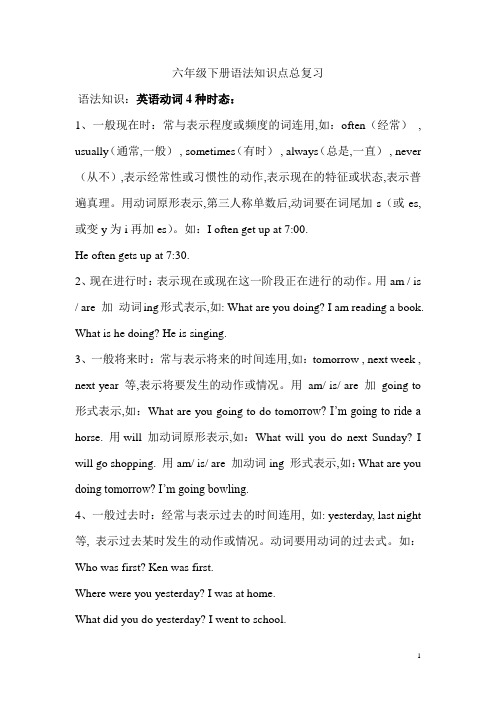
六年级下册语法知识点总复习语法知识:英语动词4种时态:1、一般现在时:常与表示程度或频度的词连用,如:often(经常), usually(通常,一般), sometimes(有时), always(总是,一直), never (从不),表示经常性或习惯性的动作,表示现在的特征或状态,表示普遍真理。
用动词原形表示,第三人称单数后,动词要在词尾加s(或es,或变y为i再加es)。
如:I often get up at 7:00.He often gets up at 7:30.2、现在进行时:表示现在或现在这一阶段正在进行的动作。
用am / is / are 加动词ing形式表示,如: What are you doing? I am reading a book. What is he doing? He is singing.3、一般将来时:常与表示将来的时间连用,如:tomorrow , next week , next year 等,表示将要发生的动作或情况。
用am/ is/ are 加going to 形式表示,如:What are you going to do tom orrow? I’m going to ride a horse. 用will 加动词原形表示,如:What will you do next Sunday? I will go shopping. 用am/ is/ are 加动词ing 形式表示,如:What are you doing tomorrow? I’m going bowling.4、一般过去时:经常与表示过去的时间连用, 如: yesterday, last night 等, 表示过去某时发生的动作或情况。
动词要用动词的过去式。
如:Who was first? Ken was first.Where were you yesterday? I was at home.What did you do yesterday? I went to school.形容词的比较级和最高级:1、单音节词:比较级加er, 最高级加est. 如:tall------taller-------- the tallest,He is taller than his brother. Tom is the tallest in his class.2、多音节词和部分双音节词:比较级加more, 最高级加the most. 如:interesting---------more interesting---------the most interesting,Music is interesting subject. P.E. is more interesting than music.. Science is the most interesting subject.形容词变为比较级的变化规则:(1)一般情况下,在形容词的词尾直接加er。
小学英语“一般现在时”知识点总结
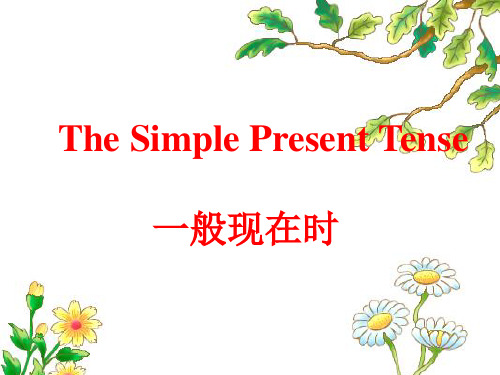
1、定义:
表示经常发生的、习惯性的动作或存在的 状态。
2、用法
通常与频率副词never、sometimes、often、 usually、always,或时间短语in the morning、on Sunday、every week等连用。
Let’s practise:
1.将下列句子改成否定句,一般疑问句并回答:
1. I speak English. I don’t speak English.
Do you speak English? Yes, I do/ No ,I don’t.
2.We like maths. We don’t like maths.
Fill the blanks
1、He _w_a_tc_h_e_s TV for 16 hours every day. 2、Lily _g_et_s_ up at six o’clock every morning. 3、She _d_o_es_n_’_t _h_a_v_e_ much money. (not have) 4、Tom _d_o_es_n_’_t __st_u_d_y_ in this school. (not study) 5、_D_o_e_s he _h_av_e_ a computer?
Let’s write :
请你根据杰克的兴趣爱好,为杰克设想一个充满乐趣的 星期天,(包括早,中,晚)他都做了些什么。要求用 一般现在时来写 ,字数8-10句。
Like
Dislike
run
go to the concert
play football
listen to the music
小学英语语法一般现在时

小学语法一(试用)人称代词与物主代词一、人称代词二、物主代词一般现在时1.表示事物或人物的特征、状态。
如:The sky is blue.天空是蓝色的。
2.表示经常性或习惯性的动作。
如:I get up at six every day.我每天六点起床。
3.表示客观现实。
如:The earth goes around the sun.地球绕着太阳转。
4.否定变化:当主语为第一,二人称及复数时,助动词为do肯定句:主语+动词原形(+其它)。
如:We often play basketball after school.否定句:主语+ don't+动词原形(+其它)。
如:we don’t play basketball after school.当主语为第三人称单数时,助动词为does肯定句:主语+动词三单式(+其它)。
如:He swims well.否定句:主语+ doesn’t+动词原形(+其它)。
如:He doesn’t swim wel l.二. 构成及变化1.be动词的变化。
肯定句:主语+be(am,is,are)+其它。
如:I am a boy.我是一个男孩。
否定句:主语+ be + not +其它。
如:He is not a worker.他不是工人。
三.第三人称单数的动词变化规则(只有在第三人称为主语的肯定句中,动词才用三单式)(1)多数动词直接加s:runs gets likes collets takes plays climbs…….(2)结尾是s, x, sh, ch, o,前为辅音字母,结尾加es :watches teaches goes does washes crosses mixes brushes (3)动词末尾y前为辅音:将y改为i加es: study→studies fly→fliescarry→carriescry→cries但在y前如果为元音则直接加s:buys says plays stays(4)不规则变化常见的:have----has四.时间标志:always , usually , often , sometimes ,every…一、写出下列动词的第三人称单数drink ________ go _______ stay ________ make ________look _________ have_______ pass_______ carry ____come________ watch______ plant_______ fly ________study_______ brush________ do_________ teach______二.用下列单词的适当形式填空1.We often___________(play) in the playground.2.He _________(get) up at six o’clock.3.__________you _________(brush) your teeth every morning?4.What________________(do) he usually________________(do) after school?5.Danny ________________(study) English, Chinese, maths, science and Art at school.6.Mike sometimes __________(go) to the park with his sister.7.At eight, she __________(watch) TV with her parents.8.________ Mike________(read) English every day?9.How many lessons_________your classmates________(have) on Monday?10.What time_________his mother_________(do) the housework?。
小升初小学英语语法总复习现在进行时一般现在时

wash finish
washes finishes
catch
go do
catches
goes does
If the verb ends in -y, we have to change the letter y into ies.
tidy study
tidies studies
carries
carry
Do Does
I/you/we/they He/she/it
do?
e.g. Do you sing? e.g. Does Sam eat fish?
Now you try.
____ he sweep the floor? Does
Do you water the plants? ____
_____ you make the bed? Do
doesn’t like sweets. e.g. I like sweets. She ____________ 1 She runs fast. I ____________ don’t run fast.
Now you try
doesn’t play 2 Paul plays football but he ____________ basketball.
need to change the verb.
He waters the plants every day. She walks the dog every day. My mum cooks us dinner every day.
When we talk about a third person (he/she/it/名单),
现在进行时的含义与构成
小学六年级英语-四大时态总复习及练习
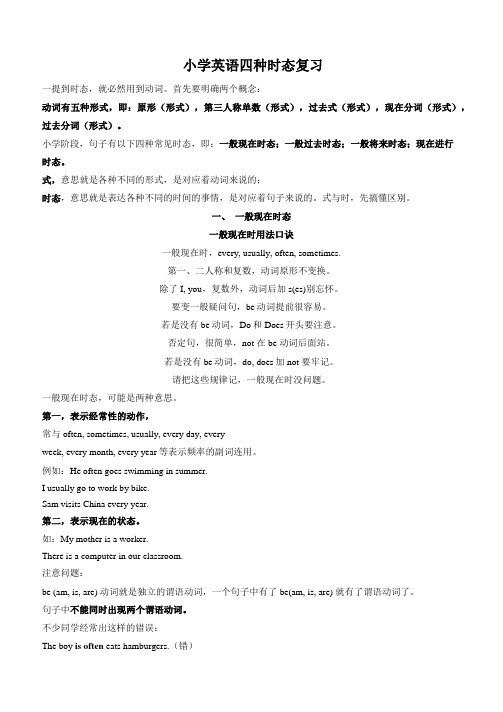
小学英语四种时态复习一提到时态,就必然用到动词。
首先要明确两个概念:动词有五种形式,即:原形(形式),第三人称单数(形式),过去式(形式),现在分词(形式),过去分词(形式)。
小学阶段,句子有以下四种常见时态,即:一般现在时态;一般过去时态;一般将来时态;现在进行时态。
式,意思就是各种不同的形式,是对应着动词来说的;时态,意思就是表达各种不同的时间的事情,是对应着句子来说的。
式与时,先搞懂区别。
一、一般现在时态一般现在时用法口诀一般现在时,every, usually, often, sometimes.第一、二人称和复数,动词原形不变换。
除了I, you,复数外,动词后加s(es)别忘怀。
要变一般疑问句,be动词提前很容易。
若是没有be动词,Do和Does开头要注意。
否定句,很简单,not 在be 动词后面站。
若是没有be动词,do, does加not 要牢记。
请把这些规律记,一般现在时没问题。
一般现在时态,可能是两种意思。
第一,表示经常性的动作,常与often, sometimes, usually, every day, everyweek, every month, every year等表示频率的副词连用。
例如:He often goes swimming in summer.I usually go to work by bike.Sam visits China every year.第二,表示现在的状态。
如:My mother is a worker.There is a computer in our classroom.注意问题:be (am, is, are) 动词就是独立的谓语动词,一个句子中有了be(am, is, are) 就有了谓语动词了。
句子中不能同时出现两个谓语动词。
不少同学经常出这样的错误:The boy is often eats hamburgers.(错)应改为: The boy often eats hamburgers.二、现在进行时态正在进行时态口诀现在分词用途多,进行时态不用说。
PEP六年级英语下册小学时态总复习 (2)

(+其它). I am not watching TV now.
一般疑问句:Be(Am,Is,Are)+主语+动词-ing (+其它)? Are you watching TV now?
根据图画利用所学的现在进行时造句。
3.一般现在时的构成(基本结构)
一般现在时分为 be 动词的一般现在时
和实义动词的一般现在时。 ①be动词: 陈述句/肯定句:主语+be(am,is,are)+其它.
I am a student. 否定句:主语+ be(am,is,are)+not +其它.
I am not a student. 一般疑问句:Be(Am,Is,Are) +主语+其它?
生的动作,强调“此时此刻”。
2、标志词: now现在
look!看
listen!听
They are playing football now.
Listen! She is singing a song.
3.现在进行时的构成(基本结构)
be(am,is,are)+动词-ing 肯定句:主语 + be + 动词-ing (+其它).
they go shopping every Sunday
They go shopping every Sunday. They don't go shopping every Sunday. Do they go shopping every Sunday?
PEP小学英语六年级总复习一般现在时
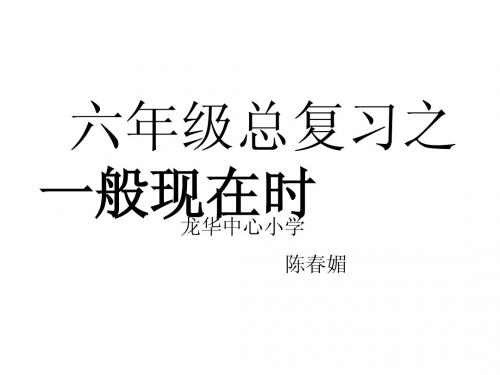
Do your parents go to Yes, they do. No, they don’t. work on foot?
Do you feel happy?
Yes, I do. No, I don’t.
Do Amy and Alice live Yes, they do. No, they don’t. in China? Do they look sad?
一般疑问句: Do+不是第三人称单数主语+行为动词(+其它)。 Do you live in China? Yes, we do. No, we don’t. Do you watch TV? Yes, I do. No, I don’t.
I do homework.
Do you do homework? Do they watch TV? Do your parents go to work on foot? Do you feel happy? Do Amy and Alice live in China? Do they look sad?
My hands are bigger than yours. They are in the same class.
Are your hands bigger than mine? Are they in the same class?
Are you a student? Yes, I am. No, I am not. Is she a worker? Yes, she is. No, she isn’t.
什么(提问事情) 在哪里 (提问地点) 在什么时候 (提问时间) 选择哪一个(提问人或物) 谁 (提问人) 怎么样 (提问方式)
小学英语语法知识点总结:一般现在时

★这篇《⼩学英语语法知识点总结:⼀般现在时》是⽆忧考为⼤家收集的,以下内容仅供参考!⼀般现在时的功能 1.表⽰事物或⼈物的特征、状态。
如:The sky is blue.天空是蓝⾊的。
2.表⽰经常性或习惯性的动作。
如:I get up at six every day.我每天六点起床。
3.表⽰客观现实。
如:The earth goes around the sun.地球绕着太阳转。
⼀般现在时的构成 1. be动词:主语+be(am,is,are)+其它。
如:I am a boy.我是⼀个男孩。
2.⾏为动词:主语+⾏为动词(+其它)。
如: We study English.我们学习英语。
当主语为第三⼈称单数(he, she,it)时,要在动词后加"-s"或"-es"。
如:Mary likes Chinese.玛丽喜欢汉语。
⼀般现在时的变化 1. be动词的变化。
否定句:主语+ be + not +其它。
如:He is not a worker.他不是⼯⼈。
⼀般疑问句:Be +主语+其它。
如:-Are you a student? -Yes. I am. / No, I'm not. 特殊疑问句:疑问词+⼀般疑问句。
如:Where is my bike? 2.⾏为动词的变化。
否定句:主语+ don't( doesn't ) +动词原形(+其它)。
如: I don't like bread. 当主语为第三⼈称单数时,要⽤doesn't构成否定句。
如: He doesn't often play. ⼀般疑问句:Do( Does ) +主语+动词原形+其它。
如: - Do you often play football? - Yes, I do. / No, I don't. 当主语为第三⼈称单数时,要⽤does构成⼀般疑问句。
小学英语 六年级四种时态总结复习过程
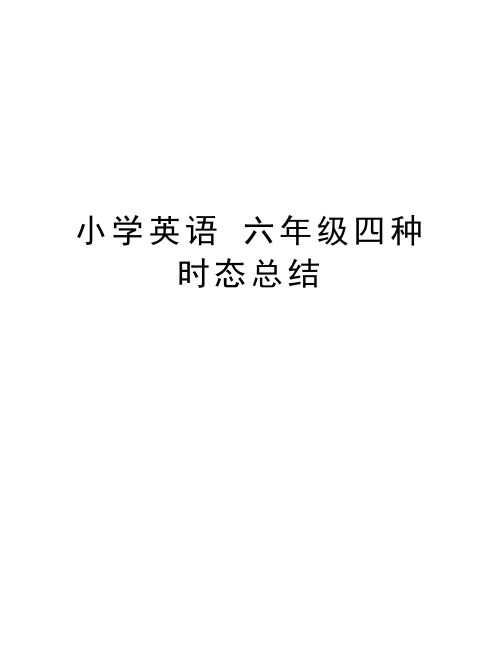
小学英语六年级四种时态总结小学英语四种时态总结1.一般现在时。
主要描述经常会发生的动作、状态或不变的真理。
句末常出现every day/week/year/Monday , in the morning, 句中常有always, usually, often, sometimes口诀:“经常有每没(美眉^^)总星周”经常:often有:sometimes (记住,“有”不是have,而是“有时”)每:every week/month/year 等没:never 总:always, usually等星周:on Mondays, on Tuesdays等组成:主语+be+名词(形容词)I am a student. He is tall.1. He is in New York with his cousin.他和他的堂兄在纽约。
2. These postcards are great.这些明信片真棒!3. It’s a picture of the Great Wall.这是一张关于长城的明信片。
4.I t’s more than twenty thousand kilometers long.它超过两万公里长5.It’s in the east of China.它在中国的东部。
6.There is a Chinatown in New York.纽约有一个唐人街。
7.There are lots of Chinese shops and restaurants there.那里有许多中国商店和餐馆。
8.There are lots of beautiful lakes in China.在中国有许多偏凉漂亮的湖泊。
9.It’s a big family dinner.它是一次大的家庭晚餐。
否定句:在be 后加notI am not a student. He is not tall.1.2.3.4.5.6.7.8.9.疑问句:be 动词提前到第一位。
通用版英语六年级下册小升初专项训练:一般现在时

【答案】A
【解析】
【详解】句意:她自加拿大。但我来自中国。前一句主语She是第三人称单数,系动词用is;后一句主语是I,系动词要用am。故选A。
20.You ________ so tired. Do you feel ________?( )
A.looked; sleepyB.looks; sleepC.look; sleepy
【答案】C
【解析】
【详解】句意:我的爷爷现在不工作。讲述现在的情况,且主语My grandpa是第三人单数,因此助动词用does,故选C。
4.What _______ you often _______ on the weekend? ( )
A.do, doesB.does, doC.do, do
【答案】C
A.is; areB.is; isC.are; are
【答案】A
【解析】
【分析】
【详解】句意:皮特是矮的。他们也是矮的。该句时态为一般现在时,前句主语Peter为单数第三人称,其对应的be动词应用is。后句主语they为复数,其对应的be应用are,故选A。
19.She _____ from Canada. But I _____ from China. ( )
A.watchB.watchesC.watching
【答案】A
【解析】
【分析】
【详解】题干句意:她晚上看电视吗?由助动词does可知,句子为一般现在时的一般疑问句,动词watch应当用其原形watch,故选A。
【点睛】
13.—How can we _______ the school? ( )
—We can get there _______ foot.
小学英语“一般现在时”知识点总结

Fill the blanks 1、I __a_m__ a teacher. 2、She __is___ three years old. 3、She _is__ _n_ot_ a student. 4、They _a_r_e_ _n_o_t_ in the classroom. 5、_I_s__ he a policeman?
一般现在时(The Simple Present Tense)
1.表示现在的状态: e.g. He is twelve. She is at work.
2.表经常或习惯性的动作: e.g. I get up at 6:30 every day.
He often goes to the English corner. 3.表主语具备的性格和能力等:
结构
1. 谓语是be动词: 肯定句:主语+be动词+其他 否定句:主语+be动词+not+其他 一般疑问句:Be动词+主语+其他 特殊疑问句:特殊疑问词+be动词+主语+其他 如: He is Jim’s father. He is not (isn’t) Jim’s father. Is he Jim’s father? Who is he ?
如: (1)I watch TV in the evening.
I don’t watch TV in the evening.
Do you watch TV in the evening?
Yes, I do./ No, I don’t.
What do you do in the evening?
(2)He likes collecting stamps.
小学六年级英语上册时态知识点汇总

小学六年级英语上册时态知识点汇总
1.一般现在时态概念:表示经常发生的或习惯性的动作或目前的状态。
规律:一般用动词原形,当主语为第三人称单数的一般现在时,动词要加s,es,标志性的单词:always,usually,often,sometimes如:Sheusuallygoestoschoolonfoot
2.现在进行时态概念:表示说话时正在发生或进行着的动作。
规律:be动词ing形式。
标志性的单词:look,now,listen如:Look,theboyisplayingfootball。
3.一般将来时态概念:表示将来发生的动作或情况。
规律:begoingtodo,willdo。
标志性的单词:tomorrow,thedayaftertomorrow,nextSunday…如:mrBrownisgoingtovisitHongkongtomorrow。
4.一般过去时态概念:表示过去某一时刻或某一时间内发生的动作或情况。
标志性的单词:yesterday,lastmonday,before,ago,thedaybeforeyesterday规律:
一般情况动词后面加ed;如:worked,cleaned,washed,以不发音e结尾的动词加d就要以了;如:lived,moved,loved
以辅音加y结尾的动词把y改成i再加ed;如:study–studied,carry—carried
重读闭音节的动词要双写末尾的辅音字母再加ed;如:
stop—stoppedshop—shoppedskip---skipped 特殊变化:见不规则动词表。
- 1、下载文档前请自行甄别文档内容的完整性,平台不提供额外的编辑、内容补充、找答案等附加服务。
- 2、"仅部分预览"的文档,不可在线预览部分如存在完整性等问题,可反馈申请退款(可完整预览的文档不适用该条件!)。
- 3、如文档侵犯您的权益,请联系客服反馈,我们会尽快为您处理(人工客服工作时间:9:00-18:30)。
1.表示事物或人物的特征、状态。
如:The sky is blue.
He is a boy. she has long hair . 2.表示经常性或习惯性的动作。
如:I get up at six every day.
I always go to school on foot.
一般现在时的时间词有:
5. She don’t do her homework on Sundays. ____
6.What does your mother teaches? ____
7.He doesn’t goes to school.____
1. Daniel watches TV every evening.(改为否定句) ___________________________________________________ 2. I do my homework every day.(改为一般疑问句,作否定回答) ________________________________________________________ ____________________________ 3. She likes milk.(改为一般疑问句,作肯定回答) _______________________________________________________ ____________________________ 4. Amy likes playing computer games.(改为一般疑问句,作否定回答) ________________________________________________________ ____________________________________ 5. We go to school every morning.(改为否定句) _______________________________________________________ 6. He speaks English very well.(改为否定句) ___________________________________________________ 7. I like taking photos in the park.(对划线部分提问) ________________________________________________________ 8. John comes from Canada.(对划线部分提问) ___________________________________________________ 9. She is always a good student.(改为一般疑问句,作否定回答) ________________________________________________________ ________________________________ 10. Simon and Daniel like going skating.(改为否定句) ___________________________________________________
动词+s的变化规则
1.一般情况下,直接加-s
如:live---lives, read---reads
2.以s. x. sh. ch. o结尾,加-es,
如:guess---guesses watch---watches go---goes do---does
wash---washes, teach--teaches
3. Amy likes playing computer games.() _______________________________ 4. She is a good student _______________________________
一般现在时的特殊疑问句:
疑问词+一般疑问句。 如:what is your hobby?
1. Is your brother speak English?
______
2. Does he likes going fishing?
3. He likes play games after class. 4. Mr. Wu teachs us English.
_____
_____ _____
当主语为第三人称单数时,要用does构成一般疑问句。
如:- Does she go to work by bike? - Yes, she does. / No, she doesn't.
1.I do my homework every day _______________________________ 2.2. She goes to school on foot
What do you do? What does he/she do?
1. I live in Zhang ye.(对划线部分提问) _____________________________________
2. My mother teaches English.(对划线部分提问) _____________________________________ 3.This is a book. (对划线部分提问) ____________________________________
11. Mike _______(like) diving. 12. They _______(have) the same hobby. 13. My aunt _______(look) after her baby carefully. 14. You always _______(do) your homework well. 15. I _______(be) ill. I’m staying in bed. 16. She ______(go) to school from Monday to Friday. 17. Liu Tao _______(not )like PE. 18. The child often ______(watch) TV in the evening. 19. Su Hai and Su Yang ______(have) eight lessons this week. 20. -What day _______(be) it today? - It’s Saturday.
当主语为第三人称单数时,要用doesn‘t构成否定句。
1.Chenjie watches TV every evening.(改为否定句) ______________________________________ 2.We go to school every morning.(改为否定句) ______________________________________ 3.He speaks English very well.(改为否定句) ______________________________________ 4. John and Bill like going skating.(改为否定句) ____________________________________
3.以“辅音字母+y”结尾,变y为i, 再加es 如:study---studies fly--flies
二、用括号内动词的适当形式填空。 1. He often ________(have) dinner at home. 2. Daniel and Tommy _______(be) in Class One. 3. We _______(not watch) TV on Monday. 4. Nick _______(not go) to the zoo on Sunday. 5. ______ they ________(like) the World Cup? 6. What _______they often _______(do) on Saturdays? 7. _____ your parents ______(read) newspapers every day? 8. The girl _______(teach) us English on Sundays. 9. She and I ________(take) a walk together every evening. 10. There ________(be) some magazines in the bookstore.
一般现在时的否定句 1.be动词的变化: 主语+ be + not +其它。 如:He is not a worker. 2.行为动词的变化。 主语+ don‘t( doesn’t ) +动词原形(+ 其它)。 如:I don't like bread. She doesn’t teach English.
一、 写出下列动词的第三人称单数
drink ________ read ________ drink make ________dive_______live ___ look ________ have_______ pass__ come________ plant_______ fly ________ carry ______ study__ brush________ do_________ go __ teach_______watch______ aq
often ,always, sometimes , usually , never, everyday
一般现在时的结构
1.be动词:主语+be(am,is,are)+其它。 如: I am a boy. He is a student .
